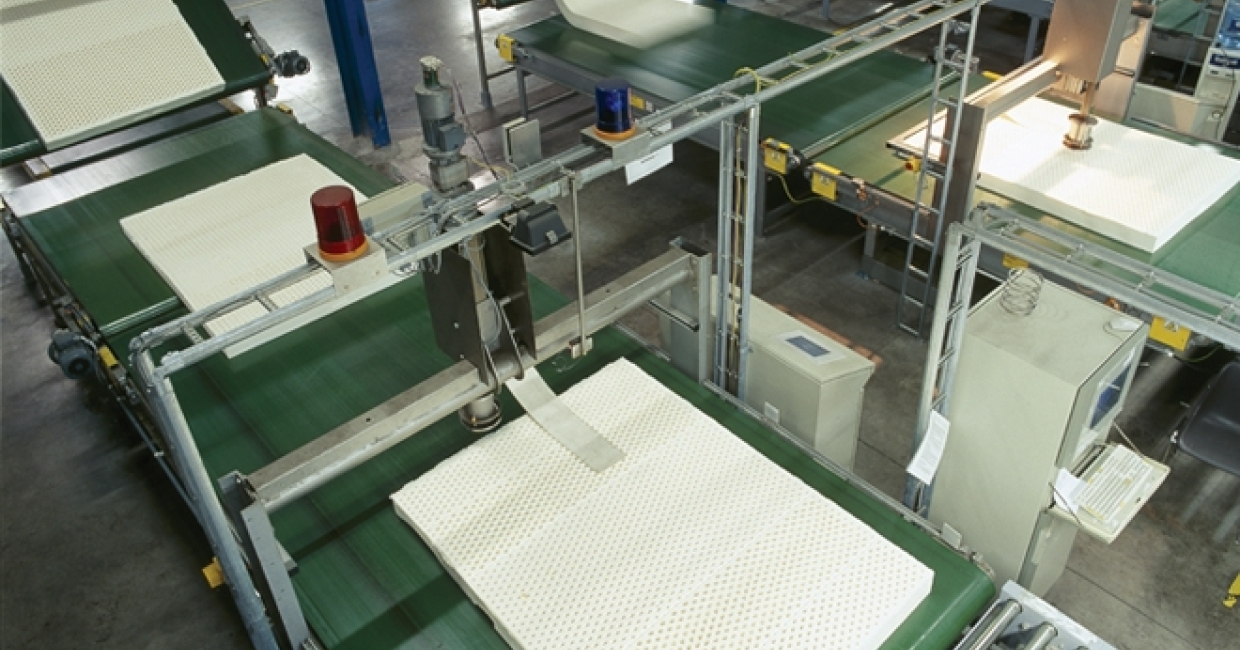According to The Sleep Council, more than a quarter of Britons experience poor quality sleep on a regular basis. A comfortable bed can make all the difference, and the UK consumer enjoys a wide choice of sprung or memory foam mattresses to suit their sleeping requirements. However, a third option is now available again, thanks to the development of new fire-retardant technology. Paul Farley visited the Belgian headquarters of Latexco, the world’s largest latex bedding producer, to find out more …
Dieter Verscheure – Latexco’s sales manager for the UK, France and Scandinavia – approached me to discuss the introduction of the company’s new flame-retardant treated latex bedding solutions at last year’s NBF Bed Show. He made a strong case.
Here was a company that recognised a market niche for latex mattress solutions in the UK, beyond the components already supplied through companies such as Dunlopillo. The UK’s stringent foam fire regulations had always prevented the introduction of uncompromised latex products, yet Latexco’s solution meant that latex could become a viable alternative to springs and memory foam – as it currently is in many countries.
The take-up in the UK occurred quicker than I could have predicted – Breasley Consumer announced exclusive distribution rights to the Latexco brand back in January, bringing UK bed retailers – both bricks-and-mortar and online – a range of products. Latexco was quick to reaffirm supply of its unbranded products through Steinhoff following Hilding Anders’ sale of its UK operation in March, and is making rapid inroads through other channels.
“The UK’s stringent foam fire regulations had always prevented the introduction of uncompromised latex products, yet here was a solution that meant latex could become a viable alternative to springs and memory foam”
However, says Dieter, Latexco is keen to find more partners in the UK. “We want to find long-term partners,” he says, “and work with them to achieve consistently good market share. The market is saturated with memory foam offers of every quality – we don’t want to make any compromises.”
Latexco’s headquarters and key manufacturing lines – as well as the company’s waste product recycling arm, Latexco Solutions – are based in Tielt, Belgium. The heavily automated, ecologically sound manufacturing facility outstrips pretty much anything I’ve seen before in the bed industry, yet the company is – understandably – reluctant to disclose details of its machinery and processes.
The company, which operates in the US, Singapore, Indonesia, South America and Spain, employing around 460 people worldwide, is perhaps best known for its ‘energy-enhancing’ Innergetic brand. In all, the group processes 37,000 tonnes of latex per year, producing mattress cores, sheets and pillow cores in combinations of standard and natural latex.
In 2011, Latexco presented its unique, patented fire-retardant treatment technology at Cologne’s interzum fair, where it won an award in the intelligent material and design category. Here was a FR solution that did not add significant weight to the product, did not contain any harmful substances or entail any hazardous manufacturing processes, yet retained the comfort levels for which latex bedding is known.
Latex, in short, is not too soft, and not too hard. Its natural resilience means it offers resistance to a sleeper’s weight in every body position, and returns to its original shape. Latexco calls this “progressive comfort” – the higher the pressure exerted on it, the greater the support it provides. Its exceptional point elasticity means that counter pressure is applied wherever it is needed, providing a good night’s sleep.
According to Latexco, the open cell structure of its components helps air circulate and moisture dissipate. It is extremely durable, noiseless, utilises natural components, facilitates movement, is hypo-allergenic – “no cases are known of people having had an allergic reaction from latex bedding, as the latex is vulcanised first”, asserts Dieter – and is resistant to mould, mildew and dust mites.
These myriad qualities make latex an immediate contender in the sleeping products arena – yet how quick are retailers likely to respond to the offer? “Latex in the US is still considered a niche,” says Dieter. “Thanks to the good reputation of latex in the UK, established by Dunlopillo, the battle to persuade retailers and consumers will be easier here.”
Currently, the UK and Republic of Ireland only accounts for a negligible proportion of Latexco’s worldwide output, but Dieter believes the product has huge potential in the UK, and the speed at which retailers have responded since its introduction certainly supports his claim.
See this month's issue of Furniture News magazine (pp. 38-9) for further illustrations.







